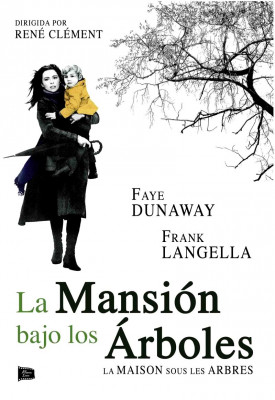| Reviews & Columns |
|
Reviews DVD TV on DVD Blu-ray 4K UHD International DVDs In Theaters Reviews by Studio Video Games Features Collector Series DVDs Easter Egg Database Interviews DVD Talk Radio Feature Articles Columns Anime Talk DVD Savant Horror DVDs The M.O.D. Squad Art House HD Talk Silent DVD
|
DVD Talk Forum |
|
|
| Resources |
|
DVD Price Search Customer Service #'s RCE Info Links |
|
Columns
|
|
|
Deadly Trap, The
Jill (Dunaway) and Philippe (Langella) are a married American couple living in an old apartment in Paris with their two children, thoughtful six-year-old Cathy (Michèle Lourie) and four-year-old hellion Patrick (Patrick Vincent). Jill is overwhelmed with family problems: the kids are a handful while her husband, employed by a publishing company, is an emotionally-distant workaholic. Their sex life is all but kaput, and she's experiencing strange memory lapses. When, for instance, she shows off to Cathy a new dress she's purchased, her daughter pulls an identical one out of the closet that Jill apparently purchased sometime earlier but can't remember buying. (This particular example doesn't make sense in light of what happens later.)
Another American living downstairs, Cynthia (Barbara Parkins), is a godsend, helping out with the babysitting and whatnot, but she asks questions about Jill's marriage hinting she may be desiring or already having an affair with him. Meanwhile, Philippe is approached by a man (Maurice Ronet) trying to compel Philippe back to work for their mysterious organization, where Philippe's brilliant mind can be put to some nefarious use. He refuses. Soon after, Jill and her two kids survive a terrifying traffic accident: Jill and Patrick are thrown from their car while Cathy is briefly trapped inside the burning vehicle. Then things get even worse.
In the first half of the story, the question is raised whether Jill, in her fragile mental state, is imagining things, becoming so paranoid that, without realizing it, she's putting her children at risk, perhaps to get them "out of the way" in order to salvage her marriage to Philippe. Or are sinister forces from "the Organization" at work, threatening the family without her knowledge?
The Gaslight-type ambiguity of the first half doesn't really lead anywhere, though the second half, if a bit more conventional, compensates, partly because the film still manages to retain its interesting qualities. René Clément's style paints a decidedly pre-gentrified, non-touristy portrait of early ‘70s Paris, one dark and foreboding. The uninviting, desaturated cinematography of Georges Pastier and Andréas Winding, and the creepy music of Gilbert Bécaud add enormously to the atmosphere, of a perpetually overcast, dank and shadowy Paris.
Almost overpowering the film in retrospect are changed attitudes in child-rearing. Compared to today's generation of overprotective, "helicopter" parents, Jill seems absurdly irresponsible. In the opening scene, she lets four-year-old Patrick wander along on the lip of an old barge winding through a complex canal system, and moments before the frightening car accident neither kid is buckled up, they instead distraction Jill moments before she slams into a lorry. In the busy streets of Paris, the kids run amok, darting out into traffic, oblivious to everything around them. This is, perhaps, to imply Jill has some kind of death wish for her kids, but just as likely it's not far removed from how little supervised children really were 50 years ago.
Dunaway, looking a lot different with her hair dyed a dark, brownish-red, is quite effective as the quietly, increasingly panicked wife-mother, troubled by all the uncertainty around her. Langella is fine as the more ambiguously presented husband. The girl, apparently French, playing Cathy is particularly good, very naturally expressive, yet she seems to have done no other films. Once the police, led by Commissaire Chameille (Raymond Gérôme), become involved, they theorizing that perhaps Jill may have murdered her children, the picture becomes much more interesting, as does Dunaway's performance.
Both the movie as originally presented and the Blu-ray leave French dialogue untranslated. Dunaway and Langella speak a little French here and there, and native English speakers should have little trouble figuring the gist of what's being said.
Video & Audio
Licensed from Studio Canal, from whom they acquired their remaster, The Deadly Trap is presented in its original 1.85:1 widescreen aspect ratio. The image, once past the slightly rougher title elements, is generally good, though by design there's a lot of soft-focus photography and muted color. The DTS-HD Master Audio (mono) is fine. Optional English subtitles are provided, but only for the English dialogue; the French goes untranslated, as in the film. Region "A" encoded.
Extra Features
Supplements include a thorough audio commentary track by Bryan Reesman, which is as much a reading of the film's style as informative about its origins and making-of info, though there is a lot of useful observations about the film's Parisian locales. A trailer is also included.
Parting Thoughts
Some may find The Deadly Trap slow and predictable. I found it dated with a lot of artsy early ‘70s French cinema touches that draw attention to themselves and distract from the narrative and characters but stick with it. In the final analysis it's a decent if not exceptional thriller. Recommended.
Stuart Galbraith IV is the Kyoto-based film historian currently restoring a 200-year-old Japanese farmhouse.
|
| Popular Reviews |
| Sponsored Links |
|
|
| Sponsored Links |
|
|
| Release List | Reviews | Shop | Newsletter | Forum | DVD Giveaways | Blu-Ray | Advertise |
|
Copyright 2024 DVDTalk.com All Rights Reserved. Legal Info, Privacy Policy, Terms of Use,
Manage Preferences,
Your Privacy Choices | |||||||














